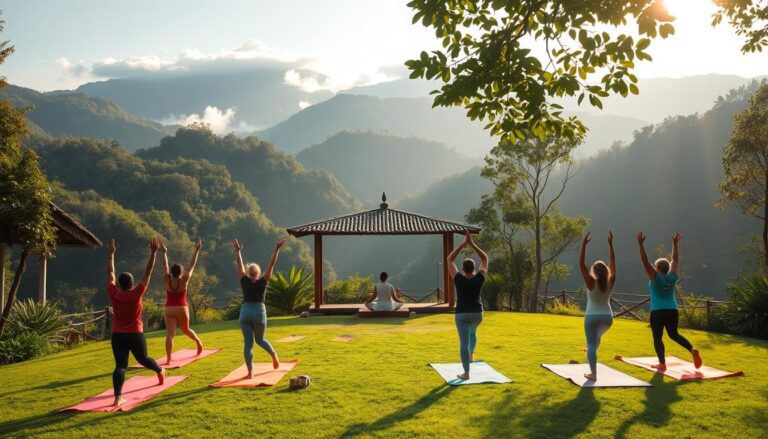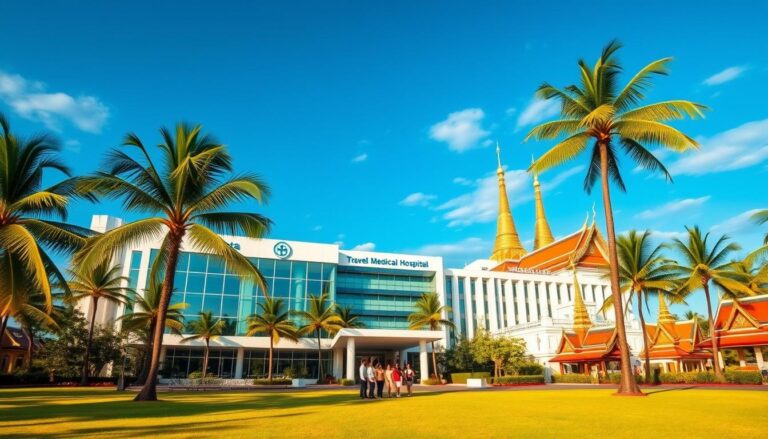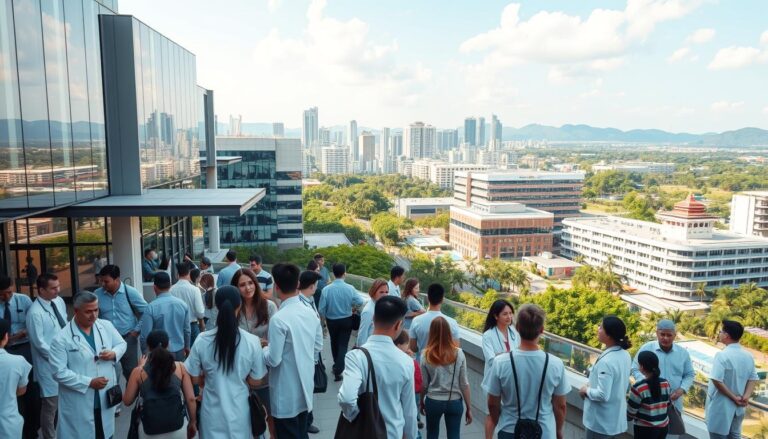Thai Medicine: Traditional, Alternative & Safe Healing
Did you know over 80% of the world uses holistic healing practices for health? In the world of traditional healing, one method is known for its all-encompassing approach to health and wellbeing.
This ancient practice uses herbal remedies, bodywork, and spiritual rituals. It focuses on the connection between body, mind, and spirit. This helps achieve balance and harmony within oneself.
Exploring this traditional method, you’ll see how it can work alongside modern healthcare. It promotes a holistic approach to your wellbeing.
Understanding Thai Medicine and Its Roots
Thai medicine has a deep history and philosophy. It combines Buddhism, Ayurveda, and traditional Chinese medicine. This mix creates a unique healing approach.

History of Thai Medicine
Thai medicine started in ancient times, during the Sukhothai period. It grew a lot during the Ayutthaya period. This history shows how Traditional Thai therapy evolved.
Thai medicine uses many Natural Thai remedies. This makes it a complete way to heal the body, mind, and spirit.
Buddhism deeply influences Thai medicine. It teaches compassion and mindfulness. These values are key in treating both body and soul.
Key Philosophical Principles
Thai medicine is based on four elements: earth, water, fire, and wind. Practitioners believe that sickness comes from imbalance. So, they use Ancient Thai healing techniques to balance these elements.
It also focuses on “sen” or energy lines. Like in Ayurveda and traditional Chinese medicine, massage and acupressure are used. These methods help unblock energy lines for healing.
Role of Buddhism in Healing Practices
Buddhism is very important in Thai medicine. It shapes both its philosophy and practice. Meditation and mindfulness are key for mental and physical health.
In Thai medicine, healers are more than just doctors. They guide patients to find balance and harmony. This approach helps people take care of their health, following Buddhist values of self-reliance.
Traditional Thai Medicine Techniques
Traditional Thai medicine offers a holistic way to heal and find balance. You’re about to learn about the methods used for centuries in Thai culture. These methods aim to promote health and well-being.
Herbal Remedies and Their Uses
Herbal remedies are key in Thai holistic healing. They’re made from plants like lemongrass, turmeric, and kaffir lime. These plants are known for their healing properties.
In Thai traditional medicine, herbs treat many ailments. This includes digestive issues and skin problems.
Preparing these remedies is a careful process. Herbs are chosen and mixed to get the right effect. You can find them as teas, balms, or compresses.
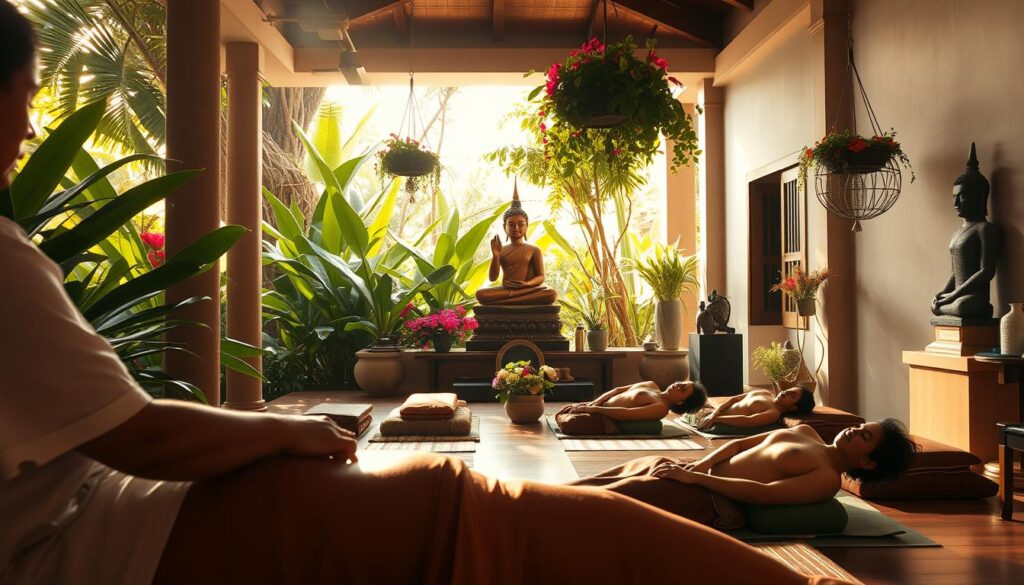
Massage and Bodywork Practices
Massage is a big part of Traditional Thai medicine. Thai massage combines gentle stretches, deep pressure, and energy line manipulation. It aims to restore balance and relax the body.
In a Thai massage, the practitioner targets tense areas. They use various techniques to release energy blockages and boost circulation.
Acupressure and Energy Healing
Acupressure and energy healing are also important in Thai holistic healing. These methods apply pressure to certain body points. This helps to stimulate energy flow and aid healing.
In Thai traditional medicine, acupressure is often paired with massage and herbal remedies. It makes these treatments more effective. By applying pressure, practitioners help balance the body’s energy systems.
By learning and using these traditional techniques, you can actively improve your health. You’ll embrace the holistic principles of Thai medicine.
Alternative Approaches in Thai Medicine
Thai medicine is evolving, mixing old and new. It’s not about replacing traditional ways but improving them. This makes healing more complete.
Integrating Modern Medicine with Tradition
Modern medicine is being combined with traditional Thai practices. This blend uses modern tools for diagnosis and traditional treatments. It offers better care for patients.
Key benefits of this integration include:
- More accurate diagnoses through modern medical technology
- Effective treatment plans that incorporate the best of both worlds
- Enhanced patient care through a holistic approach
The Role of Meditation and Mindfulness
Meditation and mindfulness are key in Thai medicine. They help with mental and physical health. These practices reduce stress and improve focus.
Some common mindfulness practices in Thai medicine include:
- Meditation techniques to calm the mind
- Breathing exercises to balance the body’s energy
- Yoga and tai chi to improve physical and mental harmony
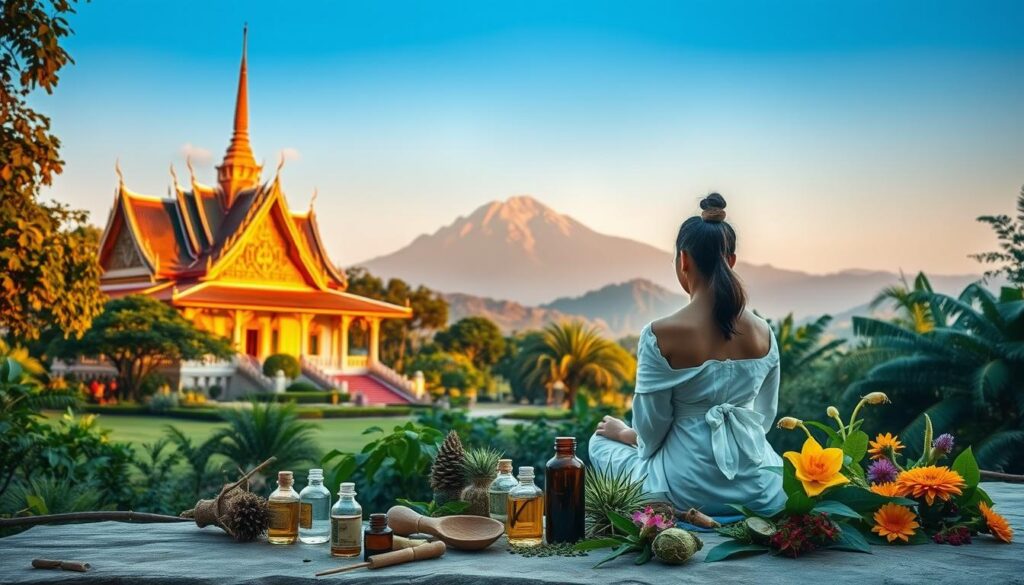
Nutritional Practices and Dietary Considerations
Nutrition is essential in Thai medicine. It focuses on diet to prevent and treat illnesses. Traditional Thai food, with its fresh herbs and balanced meals, is key to health.
Dietary considerations include:
- Eating a balanced diet rich in fruits, vegetables, and whole grains
- Avoiding foods that cause imbalance according to Thai medical principles
- Incorporating herbs and spices known for their medicinal properties
Thai medicine’s alternative approaches offer a unique healing system. It cares for the body, mind, and spirit.
Benefits of Thai Medicine
Thai traditional medicine offers a holistic approach to health and wellness. It combines physical, mental, and spiritual healing. This helps to promote overall well-being.

Holistic Healing for Mind and Body
Thai medicine treats the whole person, not just symptoms. It addresses body, mind, and spirit together. Techniques like massage, herbal remedies, and meditation help restore balance and promote health.
Preventative Care and Wellness
Thai medicine focuses on preventing illness. It uses meditation and mindfulness to reduce stress. Herbal remedies and nutritional advice also help keep you healthy.
- Reducing stress through meditation and mindfulness
- Using herbal remedies for health maintenance
- Following nutritional practices for overall wellness
Patient Empowerment through Education
Thai traditional medicine teaches patients about health care. It covers healthy living, nutrition, and stress management. This education helps patients make informed health decisions.
Understanding Thai medicine can help you make better health choices. It supports managing stress, improving physical health, or maintaining a balanced lifestyle. Thai traditional medicine offers holistic healing practices for your goals.
Thai Herbal Remedies: What You Need to Know
In Thai traditional medicine, herbal remedies are key to staying healthy. They’ve been around for centuries to help with many health issues. This includes everything from the common cold to serious conditions.
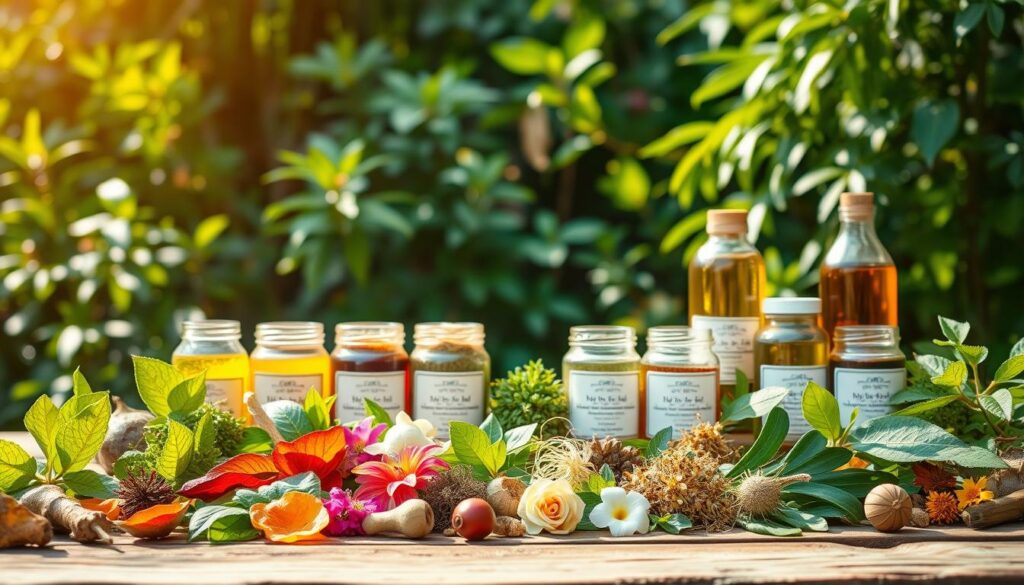
Common Herbs Used in Thai Medicine
Thai medicine uses many herbs for their healing powers. Here are some of the most popular ones:
- Turmeric: It’s known for fighting inflammation. People use it for digestive problems and pain relief.
- Lemongrass: This herb is great for fighting off germs. It helps with colds and flu symptoms.
- Andrographis: It boosts the immune system and fights infections.
Methods of Preparation and Application
How Thai herbal remedies are made and used depends on the herb and the health issue. Here are some common ways:
- Herbal Teas: Many herbs are made into teas to help heal from the inside.
- Topical Applications: Herbs are applied directly to the skin. They come as creams, balms, or poultices for skin problems.
- Herbal Powders: Some herbs are dried and powdered. They can be eaten or used on the skin.
Safety and Side Effects of Herbs
Thai herbal remedies are usually safe, but there are things to watch out for. It’s important to:
- See a doctor before trying a new herbal remedy. This is true if you’re pregnant, breastfeeding, or on other medicines.
- Know about any allergies or sensitivities to certain herbs.
- Follow the right way to prepare and use the herbs to avoid bad effects.
Knowing about the herbs in Thai medicine, how they’re made, and their possible side effects helps you use them safely. This way, you can add these natural remedies to your health routine.
Finding Thai Medicine Practitioners in the US
Exploring Thai medicine means finding a skilled practitioner. This is key to enjoying Ancient Thai healing and Traditional Thai therapy. Start by looking online for licensed practitioners near you. You can also ask friends or healthcare professionals for recommendations.
Qualities to Look for in a Practitioner
When choosing a practitioner, look at their experience and qualifications. It’s important to know their training in traditional Thai medicine. Also, ask how they understand your health needs.
Preparing for Your First Visit
Before your first visit, make a list of questions. Ask about their treatment approach and what you’ll experience. This will help you get the most from your appointment and have a good experience.
Further Learning Resources
If you want to learn more about Thai healing, many resources are out there. You can find books, workshops, and online courses. These can deepen your understanding of Ancient Thai healing and Traditional Thai therapy.




